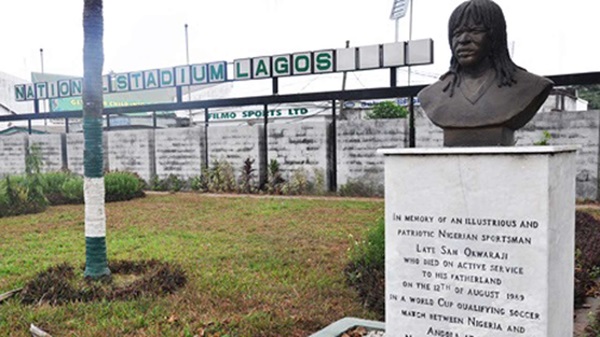On August 12, 1989, the National Stadium in Surulere, Lagos, was alive with hope. The Super Eagles were deep into a FIFA World Cup qualifier against Angola, chasing a place on football’s grandest stage.
In the 77th minute, that hope was shattered. Samuel Okwaraji, just 25 years old, collapsed on the pitch and never got up again. His autopsy revealed that he died of congestive heart failure. It was more than a loss to Nigerian football; it was a national heartbreak. Okwaraji was no ordinary player.
He famously paid for his own flight tickets to join the national team, often refusing match bonuses.
He became upset when his club, SSV Ulm, tried to place a financial barrier in the way of his participation with the Super Eagles, stating:
“You cannot stop me playing for my country, and let me tell you, I am going to represent my country in the World Cup in Italy whether you like it or not.”
His death was the first and remains the only time a player has died on the pitch while representing the Super Eagles in international football. That singular fact should make his story an enduring part of our national sports memory.
Today, a statue of Okwaraji stands at the National Stadium as a silent tribute. It is a powerful image, but also a lonely one. The stadium itself is a shadow of its former glory. Parts of the facility are overgrown and in disrepair, and the statue honoring Okwaraji now stands in the middle of neglect.
The legacy of a man who gave his life for Nigerian football deserves more than a rundown venue and an annual remembrance tweet.
After Okwaraji’s passing, there were calls for better medical readiness in Nigerian football. Some progress has been made, but decades later, inconsistencies in emergency response still haunt the game.
The real question is this: how do we ensure Samuel Okwaraji’s story remains alive for generations? Statues are important, but they do not breathe.
Legacy must be active and part of the sport’s culture. Other nations name stadiums after their heroes, host commemorative matches, and create scholarships for young talents.
Nigeria should honour Samuel Okwaraji with similar lasting initiatives that keep his memory alive. This is how a hero is remembered — by passing it on, not locking it in stone.
Thirty six years later, Samuel Okwaraji’s story still resonates with Nigerian football fans. The best way to honour a hero is not with a statue alone, but by keeping his legacy alive through actions.



